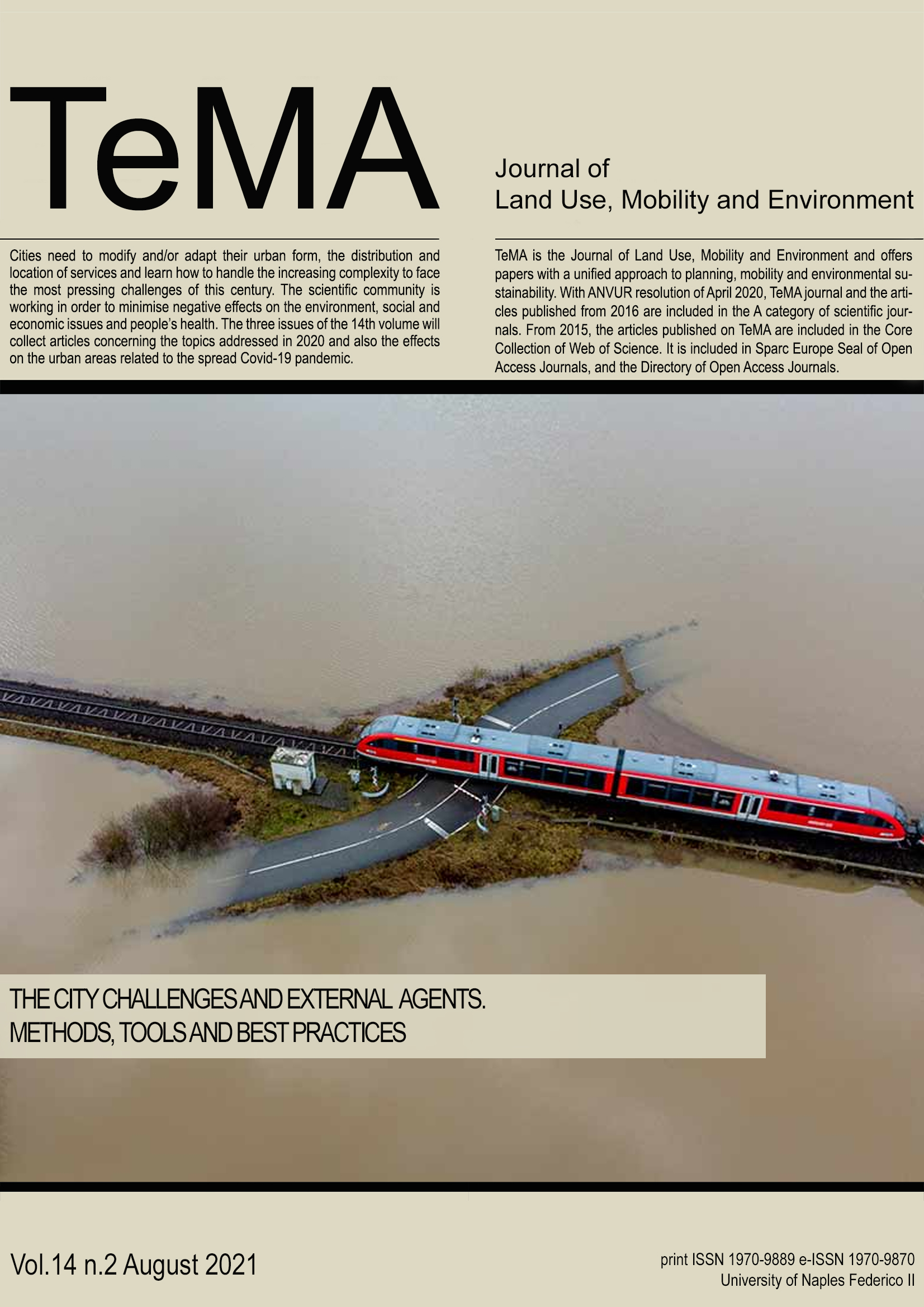Resilience as an urban strategy: The role of green interventions in recovery plans
Abstract
Starting from the relationship between urban planning and mobility management, TeMA has gradually expanded the view of the covered topics, always following a rigorous scientific in-depth analysis. This section of the Journal, Review Notes, is a continuous update about emerging topics concerning relationships among urban planning, mobility and environment thanks to a collection of short scientific papers written by young researchers. The Review Notes are made up of five parts. Each section examines a specific aspect of the broader information storage within the main interests of the TeMA Journal. In particular: the Town Planning International Rules and Legislation Overview section aims at presenting the latest updates in the territorial and urban legislative sphere. The issue of the current recovery and resilience plans and the related reforms envisaged in them aim to give impetus to new forms of organization of urban systems and all its components. In this direction, the content of this review describes the reforms envisaged in the National Recovery and Resilience Plan of Italy and Germany with a focus on the due mission based on the green revolution and ecological transition. Furthermore, this review aims to define the role of these plans for future urban strategies to face the great challenges to which cities are called to respond such as climate change, energy efficiency while also respecting the principles of environmental sustainability.
Downloads
References
Ania, A. E. D., & Joseph, A. A. (2021). COVID-19 and Africa's aviation and tourism sectors: A new agenda for the future?. Tourism Management Perspectives, 100840. https://doi.org/10.1016/j.tmp.2021.100840
Bianconi, F., Clemente, M., Filippucci, M., & Salvati, L. (2018). Regenerating Urban Spaces: A Brief Commentary on Green Infrastructures for Landscape Conservation. TeMA - Journal of Land Use, Mobility and Environment, 11(1), 107-118. https://doi.org/10.6092/1970-9870/5216
Carter, J. G., Cavan, G., Connelly, A., Guy, S., Handley, J., & Kazmierczak, A. (2015). Climate change and the city: Building capacity for urban adaptation. Progress in planning, 95, 1-66. https://doi.org/10.1016/j.progress.2013.08.001
Congressional Services Report. (2020). Global Economic Effects of COVID-19. In Congressional Research Service (Issue 20). Retrivied from: https://crsreports.congress.gov
Da Silva J., Kernaghan S., Luque A. (2012). A systems approach to meeting the challenges of urban climate change. International Journal of Urban Sustainable Development, 4(2), 125–145. https://doi.org/10.1080/19463138.2012.718279
Dodman, D., Bicknell, J., & Satterthwaite, D. (Eds.). (2012). Adapting cities to climate change: understanding and addressing the development challenges. Routledge.
Emmanuel, R., & Krüger, E. (2012). Urban heat island and its impact on climate change resilience in a shrinking city: The case of Glasgow, UK. Building and Environment, 53, 137-149. https://doi.org/10.1016/j.buildenv.2012.01.020
European Commission. (2021). Forging a climate-resilient Europe - the new EU Strategy on Adaptation to Climate Change. Retrivied from: https://ec.europa.eu/commission/presscorner/detail/en/ip_21_663
European Union. (2020). EU Climate Target Plan 2030 Building a modern, sustainable and resilient Europe. In European Union.
Gago, E. J., Roldan, J., Pacheco-Torres, R., & Ordóñez, J. (2013). The city and urban heat islands: A review of strategies to mitigate adverse effects. Renewable and Sustainable Energy Reviews, 25, 749-758. https://doi.org/10.1016/j.rser.2013.05.057
Gargiulo, C., & Papa, R. (1993). Caos e caos: la città come fenomeno complesso. Per il XXI Secolo: una enciclopedia e un progetto, 297-306.
Gargiulo, C., & Russo, L. (2017). Cities and energy consumption: a critical review. TeMA-Journal of Land Use, Mobility and Environment, 10(3), 259-278. https://doi.org/10.6092/1970-9870/5182
Gargiulo, C., Gaglione, F., Guida, C., Papa, R., Zucaro, F., & Carpentieri, G. (2020). The role of the urban settlement system in the spread of Covid-19 pandemic. The Italian case. TeMA - Journal of Land Use, Mobility and Environment, 189-212. https://doi.org/10.6092/1970-9870/6864
Kleerekoper, L., Van Esch, M., & Salcedo, T. B. (2012). How to make a city climate-proof, addressing the urban heat island effect. Resources, Conservation and Recycling, 64, 30-38. https://doi.org/10.1016/j.resconrec.2011.06.004
National recovery and resilience plans (DARP), Germany (2021). Retrivied from: https://www.governo.it/sites/governo.it/files/DARP.pdf
National recovery and resilience plans Italy (2021). Retrivied from: https://www.governo.it/sites/governo.it/files/PNRR.pdf
Rizwan, A. M., Dennis, L. Y., & Chunho, L. I. U. (2008). A review on the generation, determination, and mitigation of Urban Heat Island. Journal of environmental sciences, 20 (1), 120-128. https://doi.org/10.1016/S1001-0742(08)60019-4
Solecki, W., Seto, K. C., Balk, D., Bigio, A., Boone, C. G., Creutzig, F., ... & Zwickel, T. (2015). A conceptual framework for an urban areas typology to integrate climate change mitigation and adaptation. Urban Climate, 14, 116-137. https://doi.org/10.1016/j.uclim.2015.07.001
Xu, X., Yin, C., Wang, W., Xu, N., Hong, T., & Li, Q. (2019). Revealing urban morphology and outdoor comfort through genetic algorithm-driven urban block design in dry and hot regions of China. Sustainability, 11 (13). https://doi.org/10.3390/su11133683
Zecca, C., Gaglione, F., Laing, R., & Gargiulo, C. (2020). Pedestrian routes and accessibility to urban services: an urban rhythmic analysis on people's behaviour before and during the COVID-19. TeMA: journal of land use, mobility and environment, 13 (2). https://doi.org/10.6092/1970-9870/7051
Copyright (c) 2021 TeMA - Journal of Land Use, Mobility and Environment

This work is licensed under a Creative Commons Attribution 4.0 International License.
Authors who publish in this journal agree to the following:
1. Authors retain the rights to their work and give in to the journal the right of first publication of the work simultaneously licensed under a Creative Commons License - Attribution that allows others to share the work indicating the authorship and the initial publication in this journal.
2. Authors can adhere to other agreements of non-exclusive license for the distribution of the published version of the work (ex. To deposit it in an institutional repository or to publish it in a monography), provided to indicate that the document was first published in this journal.
3. Authors can distribute their work online (ex. In institutional repositories or in their website) prior to and during the submission process, as it can lead to productive exchanges and it can increase the quotations of the published work (See The Effect of Open Access)

